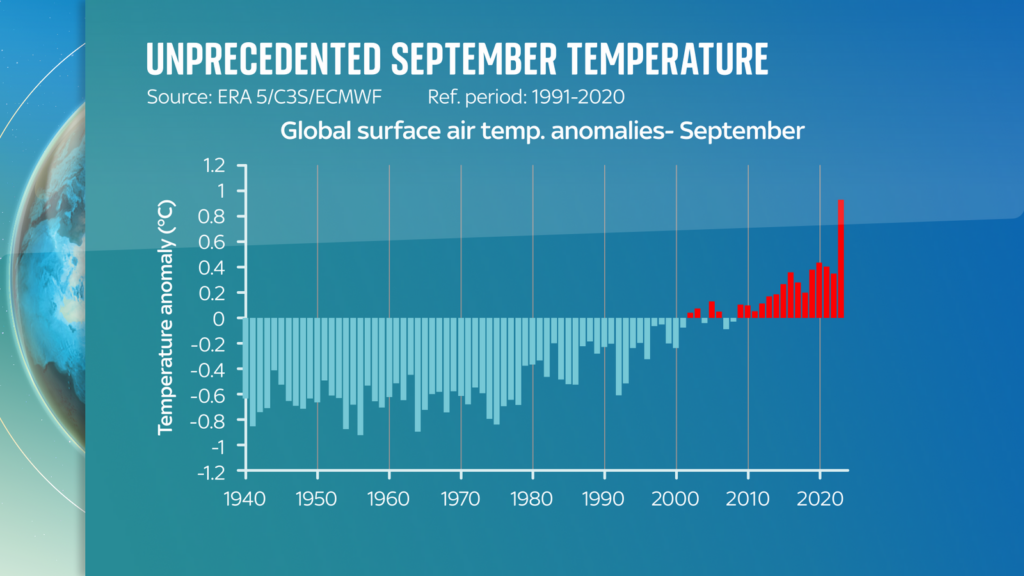Climate change is causing unprecedented heatwaves in 2023, with September setting new global temperature records. This alarming trend highlights the urgent need for global action to mitigate the escalating impacts of climate change.
September’s Scorching Heat
With a global average surface air temperature that reached 16.38 degrees Celsius in September 2023, this month was officially recognised as the hottest September that has ever been recorded.
This represents a considerable increase of 0.93 degrees Celsius above the monthly average from 1991-2020, and it also represents an increase of 0.5 degrees Celsius above the previous record set in 2020. These temperature anomalies represent real-world repercussions, such amplified heatwaves and altered rainfall patterns, which are having an effect on ecosystems, economies, and communities all around the planet.

September’s record is part of a larger issue, as the first nine months of 2023 have seen global temperatures 1.4°C higher than the preindustrial average, bringing the world close to the 1.5°C warming limit set by the 2015 Paris Agreement. The global mean temperature for 2023 is expected to surpass 2016’s by 0.05°C, with the El Niño weather pattern expected to persist into early 2024, making this projection a possibility.
While the El Niño weather pattern, characterized by the warming of surface waters in the southern Pacific Ocean, has played a role in this year’s temperature surge, it’s not the sole factor. Climate change, driven primarily by the burning of fossil fuels, remains the dominant force behind these alarming temperature anomalies. The synergy of these two factors has created a potent mix, leading to the temperature spikes observed this year.
Carlo Buontempo, the director of C3S, emphasized this point, stating, “Although El Niño has been playing a role in the warming, there’s no doubt that climate change has made it much worse.”
Europe, in particular, has felt the brunt of these temperature anomalies. The continent experienced its hottest September on record, with temperatures averaging 2.51°C above the 1991-2020 norm. Countries like France didn’t just witness warmer days; they set new national temperature records.
But it wasn’t just about the heat. Europe’s September was also marked by unusual rainfall patterns. Storm Daniel, for instance, brought extreme rainfall to Greece and caused devastating floods in Libya.
The world’s oceans, which play a crucial role in regulating global temperatures, have also shown alarming signs. September saw sea surface temperatures, excluding the polar regions, reach all-time highs. Such elevated sea temperatures can lead to more intense weather events and have cascading effects on marine ecosystems.
The upcoming UN climate talks, COP28, in Dubai, are crucial as the world faces a climate crisis. Leaders will work to reduce greenhouse gas emissions and finance adaptation and mitigation strategies. Recent findings highlight the challenges ahead, as the world is already facing one. The shattered records call for immediate action and global cooperation to address climate change threats and protect the planet for future generations.













